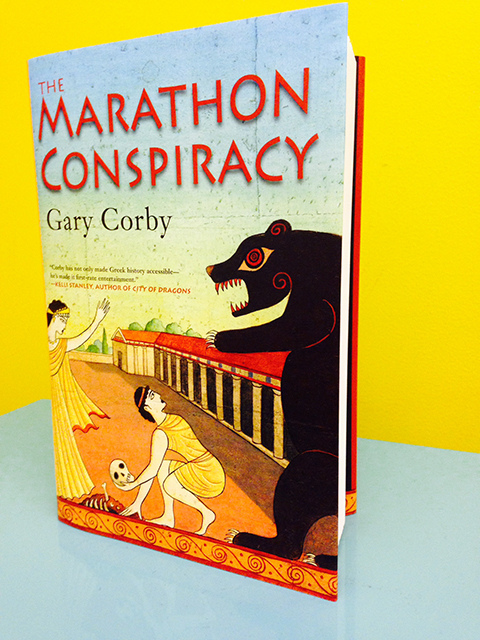
We’re so excited to be releasing Gary Corby’s fourth installment of the Athenian Mystery series, The Marathon Conspiracy, in late April. Recently, Corby was interviewed by J. Syndey Jones for his blog, Scene of the Crime, and we loved Corby’s answers about the background of the series as well as where the series is going. Named “outstanding” by Publishers Weekly, and combining mystery with rich historical detail and effortless humor, The Marathon Conspiracy captures Ancient Greece in Corby’s signatory entertaining style. The full interview, in it’s original state, is available here.
Gary, it is a real pleasure to welcome you Up Over (sorry about that) to Scene of the Crime. Can we start things off with the obvious? What made you choose ancient Greece for murder mysteries?
It was an incredibly exciting time! And unique in history.
Athens went through a golden age of about 50 years, during which they invented our civilization. In that tiny place and time, they had the world’s first democracy; they began modern theater; they had trial by jury; Hippocrates invented medical science; it’s the birth of philosophy and science. To top it off, they killed each other in such interesting ways. What’s not to like if you’re an historical mystery writer?
Nicolaos begins his career in The Pericles Commission when the new democracy is only three days old. It’s a little known fact that the guy who created the world’s first democracy was assassinated about three days later. That’s the first crime Nico has to solve.
How does your protagonist interact with his surroundings?
Nicolaos is pretty much the dumbest guy in the room.
You see, Nico has an irritating little twelve year old brother named Socrates. Yes, it’s that Socrates. Nico’s girlfriend is Diotima, a for-real lady philosopher of the time who was also a genius. His boss is Pericles, one of the greatest statesmen in all of history. Surrounded by all this genius, poor Nico is the one expected to solve the puzzles. Fortunately he has a sense of humour to see him through.
Did you consciously set out to use your location as a “character” in your books, or did this grow naturally out of the initial story or stories?
I get a huge boost from the culture. The place is famous, of course. Everyone knows the Acropolis and the temples and the mythology.
Ancient Greece gets used as the background for a lot of modern epic fantasy. Think of all the recent books and movies based on Greek heroes. That makes the setting both familiar to modern readers and, at the same time, rather exotic.
To an average reader, who perhaps isn’t a history expert, but who’s interested in the period, it’s like reading a murder mystery set in a fantastic world that really happened.
How do you incorporate location in your fiction?
You wouldn’t believe how many hundreds of hours I’ve spent working out where everything was in ancient Athens. If you planted me in the middle of Athens in 461BC, I’m sure I could walk from, say, the Acropolis to the Academy without getting lost. Nico often mentions directions and things he sees about him, but to him of course, it’s all normal.
I make lots of use of lesser known locations as well as the major landmarks.
The Marathon Conspiracy for example is about dread secrets that have remained hidden for thirty years after the famous battle. Our heroes do visit the battleground to pick up some clues, but most of the action is set at a school for girls called the Sanctuary of Brauron.
Not many people know that Athens had the world’s first official girls’ school. It’s a known site; which means the building layout in the book is what you see when you visit the ruins.
Has there been any local reaction to your works?
Local reaction for me is more to do with what the ancient historians and the classics experts.
I do get email from enthusiastic modern Greek readers. They usually ask me to include their favourite historical character in a future book. But it’s also the case that modern Greece is very different to the ancient. One classics professor who is Greek, but teaches in England, said to me that we’re all the cultural descendants of those ancient Greeks.
Continue reading at Scene of the Crime.